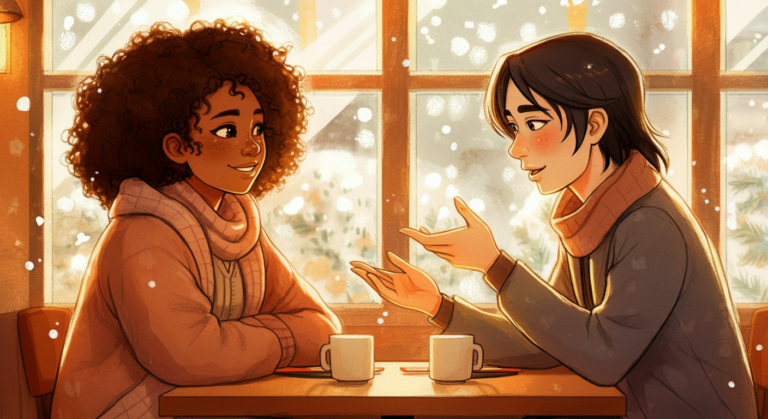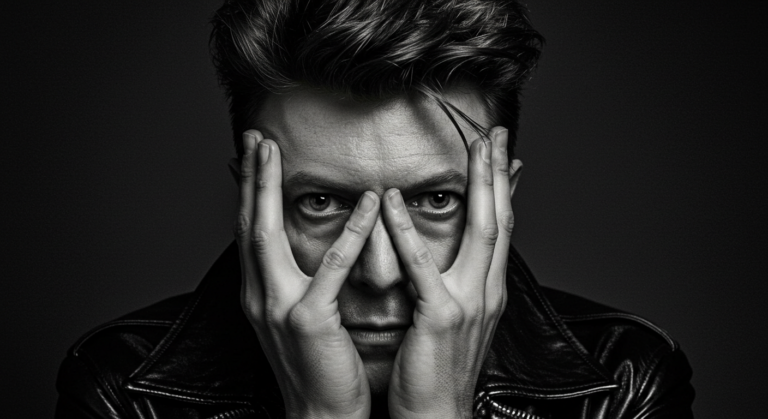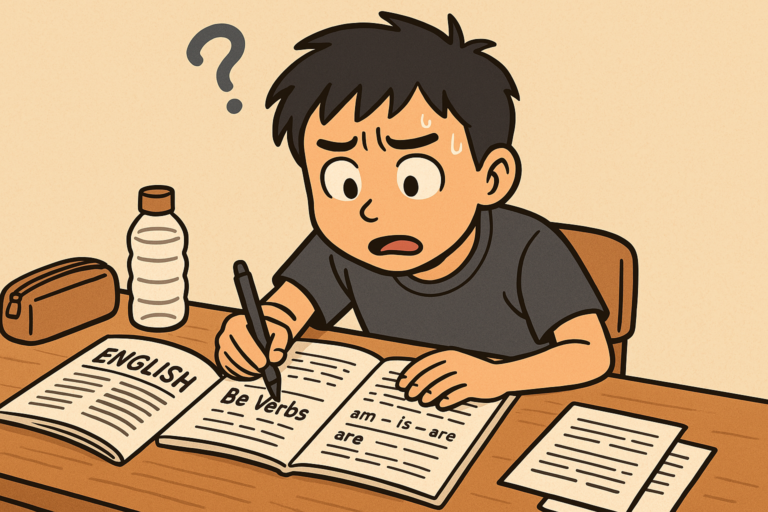Harry Potter and the Sorcerer’s Stone
Chapter 1
Listen to the audio and read the transcript.
Welcome, today we’re diving into×「Diving in」は、プールや海に飛び込むような動作から来ています。ここでは、本の内容に深く入っていく、本格的に始めるという意味で使われています。「Let's start」よりも積極的で意欲的なニュアンスを持つカジュアルな表現です。 the first chapter of Harry Potter, The Boy Who Lived.
Oh, cool.
Yeah, it’s a fun story. But sometimes new English learners might find it a little hard.
Yeah.
So we’re going to kind of read it together.×「Let's read it together」(一緒に読みましょう) はもう知っていますね。
「So we're going to kind of read it together」も同じような意味です。
これを分解してみましょう:
「we're going to」は「〜するつもりです」「〜します」という意味
「kind of」は「ちょっと」「まあ」というカジュアルな言い方
つまり、「まあ、一緒に読んでいきましょう」という感じです
「Let's〜」より少しカジュアルで、友達同士の会話でよく使われる言い方です。
両方とも「一緒に読みましょう」という意味ですが、「So we're going to...」の方が少しだけくだけた言い方です。
Okay.
And we’ll talk about some of the words…
Yeah.
…and the story, so are you ready?
Yes, I’m ready.
All right, let’s jump in×「All right, let's jump in」は「さあ、始めましょう」という意味です。
「All right」は「はい」「よし」という意味
「jump in」は直訳すると「飛び込む」ですが、
ここでは「(何かを)始める」という意味で使います
つまり、「よし、始めましょう!」というカジュアルな言い方です。
「Let's start」よりも少しくだけていて、元気の良い言い方です。
Let’s go.

So first we meet the Dursleys. They’re a family.
Okay.
And they live at number four, Privet Drive.

Okay.
And Privet Drive is the name of their street, and number four is the number of their house.
Right, so in English we say the number first, then street name.
Exactly, yeah.
And Mr. and Mrs. Dursley, they are very normal.×英語の「normal」は「普通」「一般的」という意味でよく使われます。一方、日本語の「ノーマル」は主にゲームやカード、商品の「基本バージョン」を指すときに使います。この文では「普通」という意味なので、「ノーマル」ではなく「普通」を使う方が自然です。
Okay.
They like things to be the same every day.
They don’t like surprises.
They don’t like anything strange.
Strange means not normal.
Right, different.
Different, yeah.

And they have a son, his name is Dudley.
Okay.
And Mr. Dursley works at a company called Grunnings.
Grunnings, okay.
Yes, and Grunnings makes drills.

Yeah, a drill is a tool, and it makes holes.
Okay, like in wood.×「like」はここでは「例えば」という意味で使われています。「I like~」(~が好き)とは全く違う使い方です。「like」をこのように使うと、説明の補足や具体例を挙げるときに便利です。
この文では、「ドリルは穴を開ける道具です」という説明に対して、「そう、たとえば木に穴を開けるようなものです」と具体例を示しています。
会話でよく使われるこの「like」の使い方は、「for example」とほぼ同じ意味ですが、よりカジュアルな表現です。特にアメリカ英語の日常会話では頻繁に使われます。
Yeah, exactly.
Yeah, and Mr. Dursley, he has a mustache.

Oh, fancy.×英語で fancy と言うときは「おしゃれ」という意味だけでなく、からかいや皮肉のニュアンスで「へぇ~」「なるほどねぇ」という意味でも使われます。この会話では、口ひげについて皮肉っぽく反応しているようです。
Yes, a mustache is hair on a man’s face.
It’s above his lip.
Okay.
And Mrs. Dursley has a very long neck.

She does have a long neck!×「She has a long neck.」と言う場合は、単に「彼女の首が長い」ということを述べています。
一方「She does have a long neck!」と言う場合は、何らかの前提がある中で、「彼女の首が本当に長い」ということを強調しているのが分かります。
前の文で首の長さが話題になっていたり、首が長いことが意外だと感じられる場合などに、この表現が使われます。
つまり「does」を使うことで、その事実をより強調して述べることができます。
She does, yeah.
She can use it to see over the fence?
That’s right, the book says that, it’s funny.
Yeah, it’s funny.
So the Dursleys have a secret.
Oh.
And they don’t want anyone to know this secret.
And it’s about the Potters.
The Potters.
Yes, so Mrs. Dursley has a sister.
Okay.

Her name is Lily.
Lily.
And Lily Potter is her sister.
So the Potters are different from the Dursleys.
Yes, very different.
They are not normal, they are magic.
They are, okay, so the story starts on a Tuesday.
Okay.
It’s a normal day, it’s not sunny.
Okay.
It’s gray and cloudy.
Cloudy means there are many clouds in the sky.
Yes.
And you cannot see the sun.
Exactly.
And Mr. Dursley is getting ready for work.
He puts on his tie.
His tie is very boring.
It’s not exciting.
And Dudley is having a tantrum.×「tantrum」は子供が怒って、泣いたり、叫んだり、地面に寝転がったりする行動のことです。日本語で言うと「かんしゃく」や「だだをこねる」という意味です。英語でよく「having a tantrum」「throwing a tantrum」という表現を使います。

A tantrum.
Yes, a tantrum is when a child is very angry.
They cry and shout.
It’s very loud.
It is very loud, yes.
And then Mr. Dursley sees something strange.
He sees a cat.
A cat.

And the cat is writing a map.×AIが間違って読み上げてしまいました。正しくは「The cat is writing a map」(猫が地図を書いている)ではなく、「The cat is reading a map」(猫が地図を読んでいる)です。
Wow, that’s strange.
Cats don’t read.
They don’t, do they?
This is our first sign×「sign」には主に2つの意味があります: 標識や看板などの物理的な「サイン」 兆候・前兆という意味の「サイン」 この文では2番目の意味で使われています。 that things are not normal.
Right.
And he also sees a lot of people and they’re wearing cloaks.
Cloaks.

Yeah, a cloak is like a long coat.×「like」は、ここでは「~のようなもの」「~に似たもの」という意味で使われています。
「クローク」は「長い上着」に似た服装のことを指しています。
「like」を使うことで、「クローク」という馴染みのない単語をより身近なイメージの「長い上着」に例えて説明しています。
この用法の「like」は、比喩的な表現を作るのに便利に使われます。
It covers your whole body.
Like unusual clothes?
Yes, yes.
Why?
People don’t wear cloaks every day.
Right.
And then he sees something else.
He sees owls.
Owls.

Owls are birds.
Okay.
And they usually sleep during the day, but these owls are flying around.
He sees many owls.
Other people see them too?
Yes, everyone’s seeing these owls.
It’s very strange.
Very strange.
And then he hears people talking.
And they are talking about the Potters.
Oh, the Potters.
And Mr. Dursley does not like it.
He is scared.
Why is he scared?
What do you think?
I think he’s scared because he doesn’t want people to know about the Potters.
He wants to keep his family secret.
He wants to be normal.
He doesn’t want any trouble.
Right, exactly.
Okay.
So he wants to forget about it.
Yeah.
He wants to be normal.
Yeah, but it’s hard.
Yeah.
So after work, Mr. Dursley and Mrs. Dursley, they eat dinner.
Dinner is the last meal of the day.
Right, it’s in the evening.
Yes, and they watch the news on TV.
The news tells us what’s happening in the world.
Right, exactly.
And the news talks about the owls.
The owls are acting strange.
Oh.
And the news also talks about shooting stars.

Shooting stars?
Yeah, shooting stars are lights in the sky.
They look like stars×「like」は、ここでは「~のようだ」「~に似ている」という意味で使われています。
「shooting stars」は、見た目が「星」に似ているということを表しています。
このように、「like」を使うと、2つのものが外見上似ていることを比較的に表現できます。, but they fall very fast.
Oh, okay.
Yes, and Mr. Dursley, he wants to forget about the strange things.
He just wants to be normal.
He wants everything to go back to how it was.×「go back to how it was」は「元通りになる」という意味です。ダーズリーさんは、フクロウや流れ星、マントを着た人々など、変なことが次々と起こっているので、そういった不思議な出来事が全て消えて、普通の日常に戻ってほしいと思っています。
Exactly, but then when he gets home…
Uh-oh.
…he sees the cat again.
The cat that was reading the map?
Yes, and the cat is looking at Mr. Dursley.
It’s a very strange cat.
Yeah, it seems like the strange things won’t go away.×「It seems like...」は「~のようだ」「~みたいだ」という表現です。この文では、不思議な出来事がまだ続いているという状況から判断して、「このまま終わりそうにない」という話者の推測を表しています。
They don’t, and then Mr. Dursley goes to bed.
He tries to sleep.
Okay.
But then someone comes to his house.
Oh.
It’s a man.
Mr. Dursley doesn’t know this man.
He’s a stranger.×彼は見知らぬ人です。
A stranger is someone you don’t know.
That’s right.
Yes, and this stranger is very strange.
Oh.
He hugs Mr. Dursley.
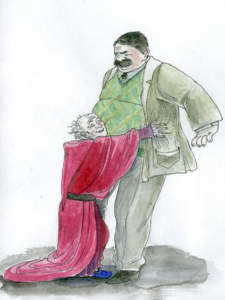
People don’t usually hug strangers.
They don’t, do they?
And then he calls Mr. Dursley a muggle×「muggle(マグル)」はハリーポッターの物語の中でのみ使われる言葉で、魔法が使えない一般の人々のことを指します。ハリーポッターのおじさんやおばさんのように、魔法使いではない普通の人間のことです。.
A muggle.
What’s a muggle?
A muggle is a person with no magic.
Okay.
It’s a word from the Harry Potter stories.
Oh, okay.
Yeah.
And the stranger talks about magic.
He says, “You-Know-Who×「You-Know-Who」は魔法界で恐れられている非常に邪悪な魔法使いのことです。その人物があまりにも恐ろしいため、多くの魔法使いは名前を口にすることを避け、代わりに「You-Know-Who(あの人)」と言います。” is gone.
“You-Know-Who” is a bad wizard.
Ah.
And people are afraid of him.
They are happy he is gone.
Okay, but Mr. Dursley, he doesn’t understand.
Yeah.
He doesn’t know about magic.
He’s confused.×「confused」は日本語で「困惑している」「混乱している」と訳せます。この場面では、ダーズリーさんは魔法の世界のことを全く知らないため「困惑している(理解できずに戸惑っている)」という状態です。
He’s confused, but we know.
Yes.
We know about magic.
We do.
We know about Harry Potter.
We do, right.
So this stranger, he’s a wizard×英語の「wizard」は「魔法使い」という意味です。日本語でも「ウィザード」という言葉を使うことがありますが、それはパソコンソフトの設定補助のことを指すのが一般的です。ハリーポッターの物語では「魔法使い」という意味です。.
His name is Dumbledore.
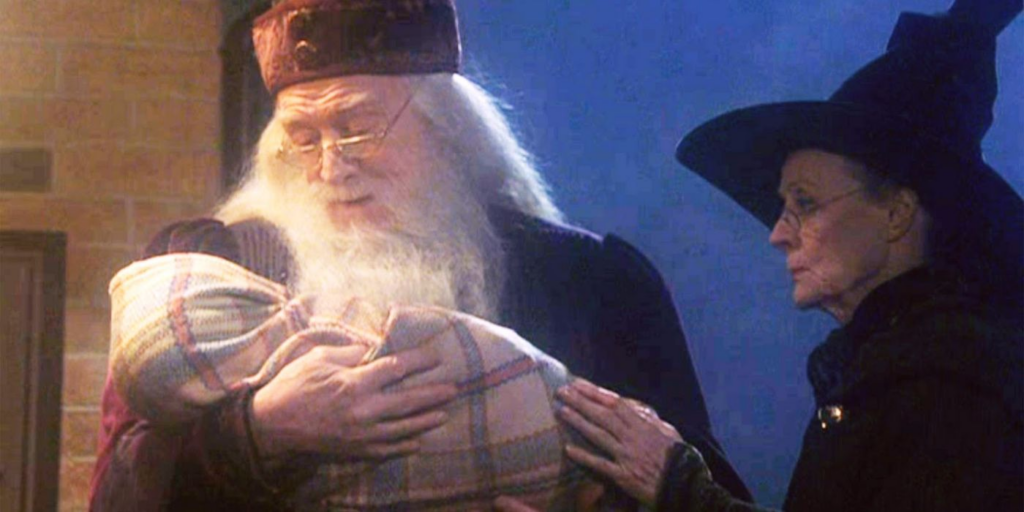
Dumbledore.
And Dumbledore has a baby with him.
And he puts the baby on the Dursley’s doorstep.
A doorstep is the area in front of a door.
Yes, exactly.
And the baby is Harry Potter.

Harry Potter, the boy who lived.
The boy who lived and Harry’s sleeping.
Okay.
He doesn’t know anything.
Mm-mm.
He is famous.
Yeah.
But he is living with the Dursley’s.
That’s strange, isn’t it?
Harry Potter is living with the Dursley’s.
Yeah.
They don’t like anything strange.×AIの発音が少し不明瞭ですが、この文は「They don't...」(彼らは...)で始まっています。「I don't...」(私は...)ではありません。ダーズリー家について話している文脈なので、「彼ら(ダーズリー家の人々)は変なものが何も好きではない」という意味です。
They don’t.
What will happen?
I don’t know.
I guess we need to read the next chapter.×「I guess」は直訳すると「私が推測する」という意味で、会話では「たぶん」「~だと思う」としてよく使われます。ここでは「次の章を読む必要がありそうだね」というやわらかい提案を表しています。
We do.
This is just the beginning.
There are many more chapters, many more words to learn.
It’s strange, right?
Harry Potter’s living with the Dursley’s.
Yeah, it’s funny.
They want to be normal.
Yeah, they don’t like magic.
They want to be like everyone else.
Right, but Harry is magic.
He is, and he’s a baby.
He’s just a baby.
He doesn’t know anything yet.
He doesn’t, yeah.
About magic or about his family.
He has a lot to learn.
So in this first chapter, we learned about the story.
Yeah.
We meet the Dursley’s.
Yeah, they are normal.
They don’t like anything different.
They don’t like magic.
They don’t like magic, but Harry is magic.
He is magic, yeah.
He is special.
He is special.
So this is like the start of the story×「like」は、「〜みたいな」という意味以外に、「えーと」「その」「なんか」のように、話す時の言いよどみ(はなしながら少し考える時)に使う言葉としても使われます。
例文:
「So this is like the start of the story」
= 「で、これが、なんか、物語の始まりなんです」
= 「で、これが、その、物語の始まりなんです」
特に若い人の会話でよく使われる表現で、文から削除しても意味は変わりません。日本語の「なんか」「えーと」と同じように、考えながら話す時の自然な間(ま)として使われています。, the normal world and the magic world they meet.
They do, what will happen?
I don’t know, that’s a good question.
Will the Dursley’s be nice to Harry?
Yeah.
Will they tell him about magic?
What do you think?
I think it will be difficult for Harry.
Yeah.
The Dursley’s don’t like magic.
Right.
But maybe, maybe they will change.
Maybe they will learn to love Harry.
Maybe.
We’ll have to keep reading to find out.×「find out」は、「知る」「明らかになる」という意味の熟語です。 ここでは「続きを読めば、ダーズリー一家がどうなるかわかるだろう」という意味で使われています。 つまり、これ以降の物語を読み進めていけば、ダーズリー一家がハリーをどう扱うようになるのかが明らかになるということです。
Yes, we will.
This is just the beginning.
It is.
There’s so much more to the story.
There’s so much more.
Well, thank you for reading with us today.
Yes, thank you.
We hope you learned some new words.
Yeah.
Keep reading, keep learning.×「keep」には主に2つの意味があります。 1.「続ける、続けていく」という意味で、ここでは「これからも読み続けましょう」「学び続けましょう」という意味です。 2.「保持する、保管する」という意味もありますが、この文脈では当てはまりません。 「keep」にはこの他にも「大切にする」「留まっている」など、さまざまな意味がありますが、ここでは上記2つの意味が重要です。
And keep listening.
Yes, keep listening and we’ll see you next time.
Bye.

